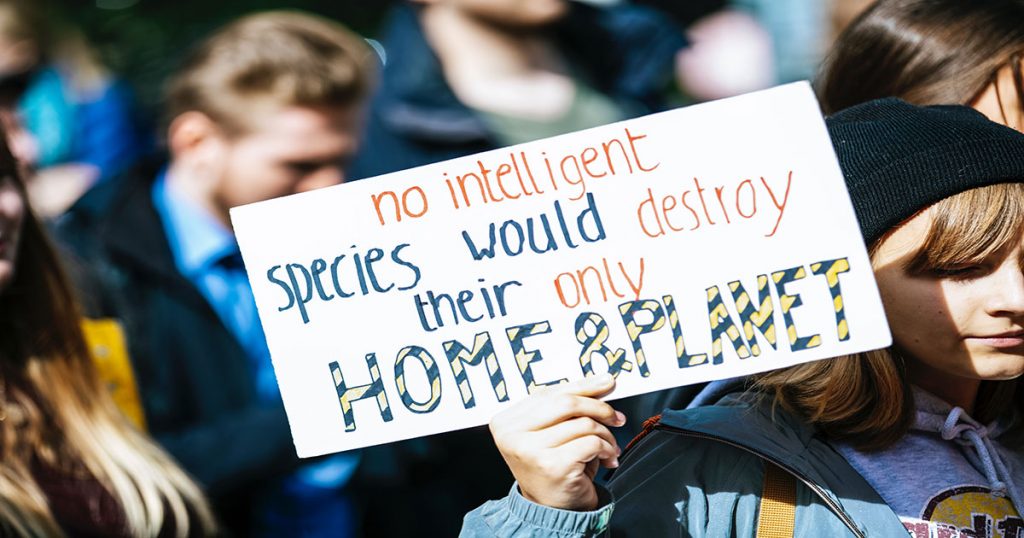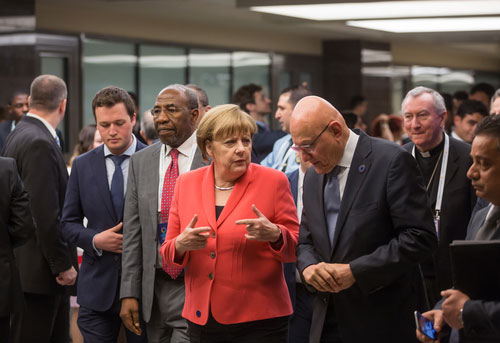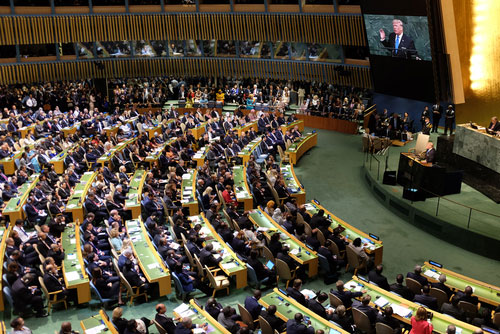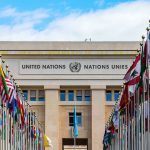Why don’t climate COPs lead to satisfactory decisions? Why do governments have so much trouble acting on the climate emergency? Well, there are several reasons why.
The 25th Conference Of Parties, COP25, started a few days ago. 25 years ago, COP1 took place in Berlin; this year’s conference was moved from Santiago to Madrid due to Chile’s complicated social situation. Two and a half decades have seen annual conferences, agreements that were signed and ratified, yet the fight against climate change has not seen much progress. So should we expect COP25 to finally bring the answer to the climate crisis?
The latest UN report includes many depressing headlines, the starkest of which is perhaps this: CO2 emissions continue to grow by 1.5% every year. But emissions need to fall by at least 3.5% a year to avoid the temperature increase of 2 degrees by the end of the century that would kill virtually all reef life and put marine ecosystems at stake.
Why is it that after 24 COPs we are still not doing enough to stop global warming? Let us try to unravel this puzzle.
COP And Global Warming: Many Meetings, Little Action
COPs are annual meetings where global governments try to put in place a common process to fight global warming. These conferences are organized under the United Nations Framework Convention on Climate Change. They led, for instance, to the signing of the Kyoto Protocol in 1997, which marked the first commitments to reduce CO2 emissions. Or to the famous Paris Agreement where the compromise to less than 2 degrees of temperature increase was reached too.
So it is possibly unfair to say that COPs always end up with zero results. Because, in reality, they allow world governments to come together and reach treaties. The problem is that these treaties have always been “non-binding” treaties. In concrete terms, this means that even if a government signs an international treaty like the Paris Agreement, nothing forces it to respect its commitments. Of course in theory, in international law, treaties are binding. But in fact, no clause within these treaties presupposes any “sanction” against a state that does not respect its initial commitment.
So we have this disappointing reality to contend with. Each year we continue to hold conferences and to come together with new treaties and agreements. But then there is no guarantee that these treaties will be respected, and it’s clear that the goals of these treaties are barely achieved.
COP: The Tragedy Of The Commons On The International Scenario

The tragedy of the commons is an interpretation that can be applied to international governance. The climate and its stability are of interest to all of us in common: all the countries of the world need a stable and functional climate to operate properly. Specifically, we need supplies of clean water, clean air, and productive land. These are common goods, which benefit everyone.
Yet these trans-national commons can be affected by a country’s individual actions. When a country develops its energy network using carbon-intensive fuels, it has the positive goal of developing its economy and improving the living conditions of its population. Nevertheless, in pursuing these social goods for its people, it ends up polluting, emitting CO2 and harming the planet – consequences everyone will suffer, even if they did nothing to deserve it (as is often the case with developing countries). CO2 and pollution don’t respect borders. Ultimately the action of every country affects a common good – our balanced climate – which belongs to everyone.
Then there is the question of how to manage these common goods: to what extent should regulations that prevent a country (or a company or group of individuals) from degrading a common good, be put in place? Since everyone is affected, in the ideal world we would make these decisions together.
But in the eyes of international law, each country is sovereign and decides its own laws. So in theory, there is nothing that allows one country, or several countries, to impose their will on others. There is no “international police” to impose fines on a state or force it to emit less CO2. Nor is there any international court that can compel a government to act in a particular way. So if a country wants to push others to be part of the climate protection journey, it needs to negotiate.
International Negotiation On Climate And Climate Inaction
The role of COPs and the UNFCCC (United Nations Framework Convention on Climate Change) is clear. They must encourage all countries of the world to negotiate a good method to manage the climate together.
So obviously, on paper, almost everyone agrees: we must limit global warming. Except that in practice, it is much more complicated. How do we do it? Where do we start? And who pays for all this? And the truth is that countries with different cultures, various backgrounds, distinct ways of dialoguing, different levels of progress and with mixed political views do not always agree.
Let’s focus on energy and imagine we would try to get a consensus to close all fossil fuel power plants. Countries like Costa Rica or France, running mostly on renewables and nuclear respectively, would probably not mind much. However, China or Germany would undoubtedly find this idea much more complicated, since more than half of their electricity production comes from fossil fuel power stations. Conversely, if we were to redesign transportation and plan road traffic reduction, San Marino (the country with most cars per capita: 1263 per 1000 people) would be more resistant to this idea than for instance, Mozambique, where only 14 in 1000 people have a car.
So it is not that the answer to stopping climate change is unknown: it isn’t. We (globally speaking) “just” have to close all coal and fossil fuel power plants and ban the production and use of fossil fuel-powered cars. Together, these two sectors account for roughly half of greenhouse gas emissions. By taking only these two efforts, we would have almost won the fight.
It is hard, but we must find a global common ground. And if possible, a common ground that is not too restrictive so that all nations freely agree to engage, sign the treaties and start acting. Not very demanding treaties don’t look great, right? However, it is also hard to imagine a state willing to sign a treaty that would require difficult measures at the risk of facing economic competitiveness, losing jobs or creating social tension, right?
COPs And Global Warming vs The Economic Imperative

The problem is that fighting global warming is difficult. For example, limiting the use of cars will likely mean facing the opposition of a population angry about losing some comfort and taking longer to get to work. This is precisely what happened with the recent increase in fuel taxes that led to the protests from the Yellow Vests in France.
From another perspective, if we focus on energy production, moving away from oil, coal or gas is the way to go to decarbonize the grid. However, this is expensive and cannot be done overnight, especially when the alternatives (intermittent renewables) are not always a realistic option.
Therefore, reaching a consensus on these issues is not easy, which is why COPs seldom lead to effective results. If we look closely, the treaties reached never say how goals should be achieved; instead they set figures and commit to attaining them somehow… This is, in fact, part of the reason why COP21 in Paris was such a success: each state was free to decide how to achieve the targets for reducing greenhouse gas emissions.
Country’s Individuals Pathways Are Not Easy To Define Either
Even with the freedom to decide how to achieve common goals, things are still complex. Identifying what measures would be the most effective is a huge challenge for all nations. And one that requires plenty of specialists and variables that are hard to predict.
For instance, a government should not just decide out of the blue to completely ban plastic. This would be unfeasible and unrealistic, since too many industries depend on it and many people depend on their benefits. So before going for this ban, it would be wise to first find alternatives, and then produce studies to guarantee these alternatives would truly be more sustainable. As we can see, apparently easy-to-implement measures are not that simple and have trade-offs that we often forget about.
Here’s another one: it would be, in theory, possible for a country to “tax imported products” to reduce CO2 emissions related to transportation and encourage local consumption. This reasoning is perfectly valid, but again, it has trade-offs. Because if a state decides to tax certain products, those producing them will be hurt with higher costs and will probably increase their prices. In the end, maybe consumers will be the ones paying the price and purchasing the same products they used to, at a more expensive price. And in the worst-case scenario, such taxes can even lead to trade wars – like the one happing right now in the United States since Donald Trump decided to tax imports from China.
In the end, behind every climate decision, there are complex economic and social consequences, and governments must take them into account. And in a globalized economy, every decision can have unpredictable consequences on a country’s economy, employment or purchasing power. And this partially helps to explain why governments are tackling the climate crisis at such a slow, gradual pace.
The Contradictions Of Fighting Climate Change

On the one hand, we want less CO2, and citizens demand that this change take place. But we are often not willing to change our transportation habits, reduce our energy bill or pay slightly more for greener electricity, right? We would like to tax imported products, make companies pay a carbon tax or tax the fuels of transport cargo ships. But we want all this to take place without seeing purchasing power decrease, and without creating unemployment.
We would like to limit industrial overproduction, but without giving up either our consumption habits or the economic growth and comfort it provides. The problem is that this is obviously not possible and, faced with these contradictions, governments are obliged to reach agreements.
In many cases, they choose to prioritize the economy in the short term. First, because the integrity of the system depends on it, and also because that is where the most immediate priorities of the citizens who elect them are. At best, when governments implement environmental policies, these are limited or moving slowly because they are intended not to have too much negative impact neither on economic indicators nor on the public opinion.
Are COPs Useless?
Since it is very hard to force all countries to give up their economic and social concerns and put climate change ahead of them, COPs have an impossible mission. Of course, minor changes and synergies are found, but they are very far from the drastic changes that need to take place to effectively tackle the climate problem.
Nonetheless, COPs are still one of the few events that discuss these issues at an international level and try to reach a consensus. They are, at the very least, gradually making it possible to bring global warming into international relations as an urgent crisis to be resolved.
More and more actors are convinced of the need to act on these issues and COPs give them an opportunity to come together and mobilize for action. And alliances and partnerships, commercial, diplomatic and political pressures can sometimes trigger “small actions” that can help mitigate the rise in emissions. This is the objective of COP25: to try to convince the largest polluting nations to raise their ambitions in the reduction of CO2 emissions and adopt bolder public policies.
In the end, COPs are clearly insufficient for the dimension of the problem we have at hand today. We need to go much further. And much faster. But the reality is that there is no quick fix and without COPs, progress will happen at an even slower pace. So even though the results are far from optimal, COPs are not useless. They are an opportunity to raise awareness of governments that are not prioritizing climate issues. COPs may look like nothing but, in the absence of better alternatives, they are still leading the way in the fight against global warming.
[Image credits to Geneve, leaders and minister on Shutterstock]

